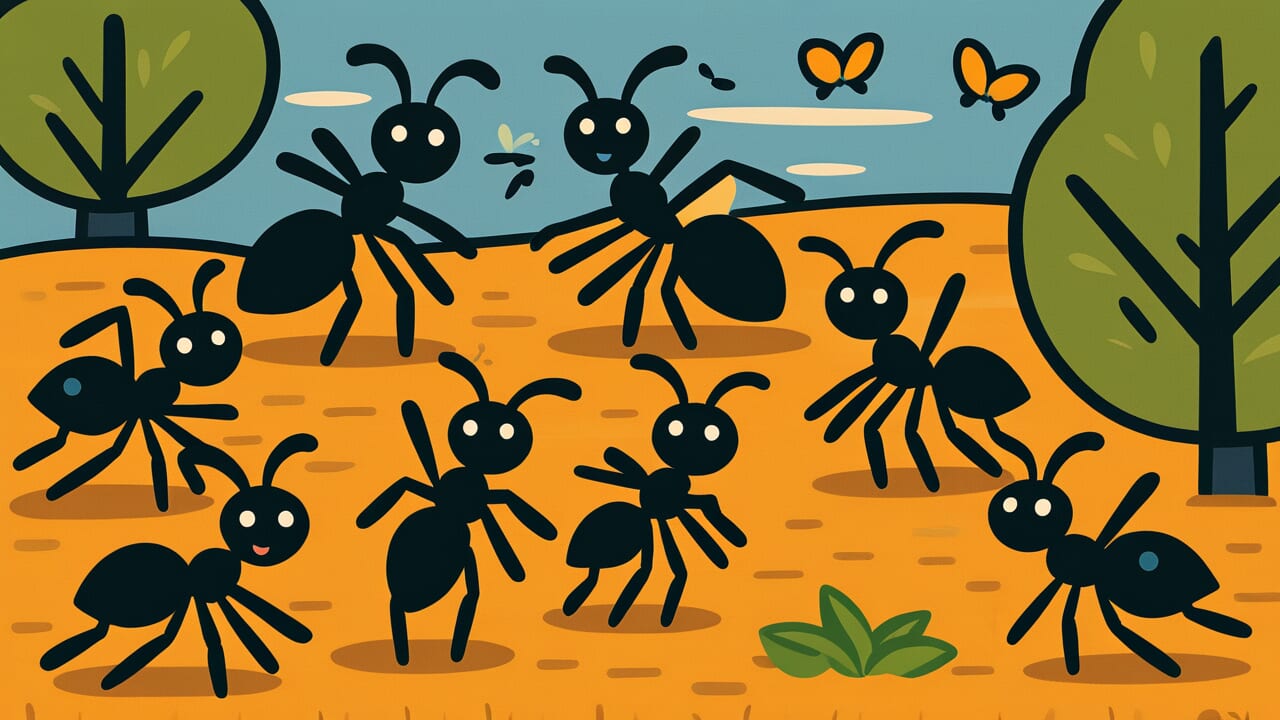How to Read “Ants gather and shake a tree”
Ari atsumatte ki wo yurugasu
Meaning of “Ants gather and shake a tree”
This proverb means that even small forces become great power when many gather together. Things that seem impossible can be achieved.
Each person’s strength may be tiny. But when many people cooperate toward the same goal, they can produce results beyond imagination.
People use this saying to encourage group efforts. They also use it to give courage to those who feel their individual power is limited.
When someone feels like giving up, thinking “I can’t do anything alone,” this proverb offers hope. It tells them that working with others opens new paths.
Today, this teaching lives in many situations. Citizen movements, community activities, and workplace projects all reflect this wisdom.
Small voices gathering through social media can move society. This phenomenon perfectly shows the truth that “Ants gather and shake a tree” teaches.
Origin and Etymology
The exact source of this proverb has several theories. The most likely explanation traces it to ancient Chinese classics.
Ancient Chinese philosophical texts like “Xunzi” and “Han Feizi” contain ideas about small things creating great power when gathered. This proverb likely developed in Japan under that influence.
The choice of ants carries deep meaning. A single ant is truly tiny. A human finger can easily brush it away.
But ants act in groups. Together they carry prey dozens of times their body weight. They build enormous nests. Ancient observers saw human society’s truth in ant behavior.
The expression “shake a tree” is also interesting. A large tree symbolizes something immovable with deep roots.
The image of tiny ants joining forces to shake that great tree perfectly shows how the weak can challenge the strong through unity.
Documents from Japan’s Edo period contain this expression. People say it was widely used among common folk for centuries.
Interesting Facts
Ants can actually carry objects 50 times their own body weight. Even more amazing, science has confirmed something remarkable about group work.
When ants work together, they generate power greater than the sum of individual ants’ strength. This is a perfect example of “synergy” born from cooperation.
Japan has several other proverbs about ants. People have long noticed their diligence and cooperation.
Though small creatures, their behavior teaches ideal cooperative relationships for human society. People have observed them continuously throughout history.
Usage Examples
- Community cleanup activities follow “Ants gather and shake a tree” – if everyone participates a little, the whole town becomes clean
- One signature won’t reach them, but “Ants gather and shake a tree,” so let’s gather friends and raise our voices
Universal Wisdom
This proverb has been passed down for generations because it captures two human truths perfectly. One is “individual powerlessness.” The other is “collective possibility.”
Everyone experiences moments when they feel how small their individual power is. Facing huge organizations, unreasonable authority, or unchangeable reality, people feel crushed by helplessness.
But humans are social creatures. Throughout history, we have overcome difficulties by cooperating with others.
The deep insight this proverb offers is that weakness needs no shame. A single ant being weak is not a flaw. It’s just a fact.
What matters is the choice of how to act after acknowledging that weakness. Will you give up in isolation? Or will you seek companions and unite?
Most great changes in human society came not from powerful leaders’ decisions. They came from the accumulation of small actions by ordinary people.
This proverb teaches that history moves not through special heroes but through united will of common people. That’s why it continues resonating across generations.
When AI Hears This
As ants increase one by one, the tree doesn’t budge at first. But once they pass a certain number, it suddenly starts shaking violently.
The forces aren’t simply adding up. A “critical phenomenon” from physics is occurring.
Consider the moment ice becomes water. Ice stays solid as it approaches zero degrees. Even as temperature rises 0.1 degrees at a time, nothing visible changes.
But the instant it crosses zero degrees, the critical point, molecular arrangement shifts all at once into liquid. The ant-tree relationship works the same way.
Individual ants applying force to the tree maintain a “still bearable” static state inside the tree. But when ant numbers exceed a threshold, the tree’s entire vibration system suddenly enters “resonance mode.”
The system’s state itself switches.
The frightening thing about this phenomenon is no warning signs appear until just before the critical point. Social media firestorms, stock market crashes, and revolutions follow the same pattern.
Nothing happens through 99 attempts, but the 100th changes the world. Individual participants hold the same small power, yet the moment they cross the critical point, the entire system jumps to a different state.
So conventional predictions of “gradual change” don’t work in such systems. Change arrives suddenly.
Lessons for Today
This proverb teaches modern people not to give up on action because of their smallness.
Modern society creates more situations where people feel individual powerlessness. Facing giant corporations, complex social systems, and global problems, people easily think “nothing I do alone will change anything.”
But this proverb teaches that this very mindset blocks change.
What matters is taking the first step. If you care about environmental issues, start with small eco-activities you can do. If you want to improve your workplace, try speaking up first.
That small action attracts people who share your feelings.
And today we have unprecedented tools for cooperation. Through social media, connect with people who share your goals. Gather funds through crowdfunding. Share wisdom online.
Just as ants use pheromones to call companions, your action calls the next action. Eventually it becomes a great wave.
Never underestimate your small first step.



Comments